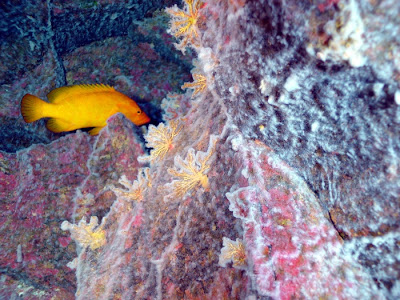Beauty can be overwhelming for an artist. I was struck by a postcard that Matisse wrote to Bonnard from Tahiti, Pateete, on 6 June 1930:
« Ai vécu 20 jours dans une « île de corail » : lumière pure, air pur, couleur pure : diamant saphir émeraude turquoise. Poissons mirobolants. N’ai absolument rien fait excepté mauvaises photos. » [Quoted from the Matisse / Bonnard Correspondence 1925-1946 (Gallimard – ISBN-10: 2070722376 – in French)]
We can translate this as:
« Lived 20 days in a «coral island» : pure light, pure air, pure colour: diamond sapphire emerald turquoise. Fabulous fishes. Did absolutely nothing except bad photographs. »

Source: http://www.photolib.noaa.gov/index.html
Location: Mariana Arc region, Western Pacific Ocean
Credit: Pacific Ring of Fire 2004 Expedition. NOAA Office of Ocean Exploration; Dr. Bob Embley, NOAA PMEL, Chief Scientist
Location: Mariana Arc region, Western Pacific Ocean
Credit: Pacific Ring of Fire 2004 Expedition. NOAA Office of Ocean Exploration; Dr. Bob Embley, NOAA PMEL, Chief Scientist
The power of the artist is to turn ordinary subjects into extra-ordinary works. I find a particular strength in everyday subjects because it is like waking-up viewers to their surrounding. You paint a building and people who have lived in town for years suddenly realise its existence. Beautiful landscapes don’t need any help from artists to get noted.
The artist faces a dilemma. New scenery brings many potential painting subjects because of its novelty. However, the lack of familiarity with the location makes it more difficult to capture the mood of a particular place. On the other hand, you live in a place for too long and you don’t see it anymore. As Picasso said: “Seeing, this is what is difficult, we are seeing sometime, rarely. We are watching without seeing.” (« Voir, c’est ça qui est difficile, on voit parfois, rarement. On regarde sans voir. » - Picasso quoted by André Verdet in his book “Picasso et ses environs”)
We need to learn to see as an artist, to see a painting in the landscape, right before our eyes.
You can develop strategies to revive the novelty in the familiar:
- Painters will paint the same spot again years after a first attempt. They also travel to the same locations at regular intervals, learning each time a little bit more about the place while discovering it again each time.
- Developing over time a series of works based on the same place.
- Painting as part of a group to see how other painters capture the subject. Impressionist painters did this a lot. Cézannes and Pissarro went together to paint landscapes that Pissarro had first painted in the late 1860s.
Matisse Bonnard Tahiti Painting subject Pisarro Cezanne Picasso Art quote Art history

No comments:
Post a Comment
I would like to know what you think about my art and my posts. Feel free to ask questions. No advertising links in comments please.